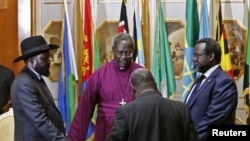South Sudan's much-delayed peace talks are scheduled to pick up again next Thursday in Ethiopia's capital. But analysts say diplomatic efforts won't succeed unless East African leaders use both carrots and sticks to force the warring sides to compromise.
South Sudan has been mired in fresh conflict for nearly two years since a power-sharing deal collapsed in July of 2016.
Speaking to VOA, the head of the U.N. mission in South Sudan, David Shearer, said there are two fundamental issues on the agenda for the upcoming peace talks in Addis Ababa.
The first is security. "What's the shape of the army?" he continued. 'What [are] the armed forces going to look like if you bring all those parties together?
The second thing, he added, "obviously is the constitution and the governance — who governs, what's the progress towards — ultimately to elections and how is it going to happen? So it's a little unclear at the moment exactly where everybody sits on that spectrum of being able to come together."
Delays have set back efforts to hold the talks this year. Opposition and rebel groups have demanded the departure of President Salva Kiir.
The government has pushed for elections, though many, including the United States, doubt a credible vote is possible under current conditions.
The African Union maintains that negotiation is the best route to peace and stability in South Sudan. However, the five previous deals mediated by East African regional bloc IGAD have failed.
James Okuk, who teaches political science at Juba University, said "if IGAD is looking for the government or the opposition to come up with something, I don't think they will come up with it."
"It's for the IGAD now to find what is the middle way that they can propose," he added. "And if they propose that middle way, then that middle way — it's what should be negotiated by those parties."
A lot has changed since the 2016 clashes that forced rebel leader Riek Machar from Juba. More rebel and armed groups have emerged, and government forces have retaken ground.
There is also tension within the opposition camp. One group has agreed to join Kiir's proposed unity government, while the other faction is staying away and wants to revive the 2015 peace agreement. Machar's allies say he will not accept Kiir's invitation to return to the country and reconcile without a peace deal.
Casie Copeland, a researcher with International Crisis Group in Nairobi, said the sides will need pressure or incentives to reach a peace deal and follow through with it.
"We don't necessarily see the international community having a well-organized strategy to provide that," she said. "So what I fear is that this diplomatic effort that is going on might not actually achieve anything because it's not backed up with this sort of support of the region to really try to shift the views of the conflict parties."
Thousands have been killed since the war began in late 2013, and to date more than four million South Sudanese have been forced from their homes. And aid agencies now warn of severe hunger and say parts of the country once again risk famine this year.


